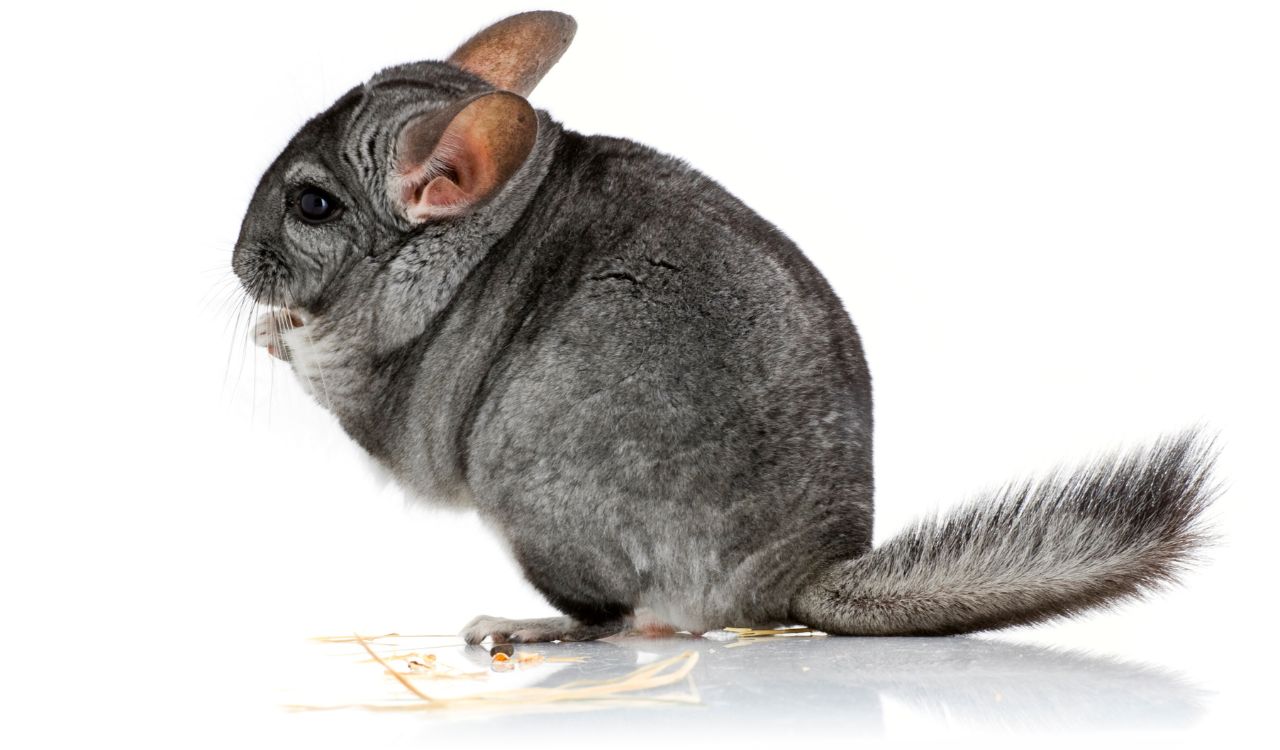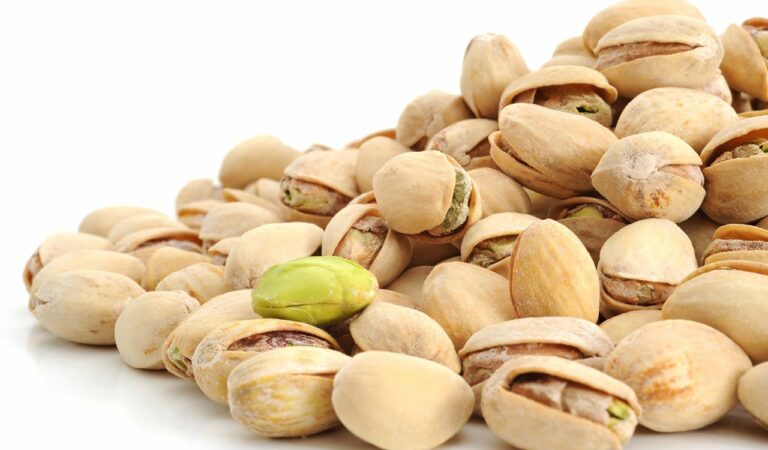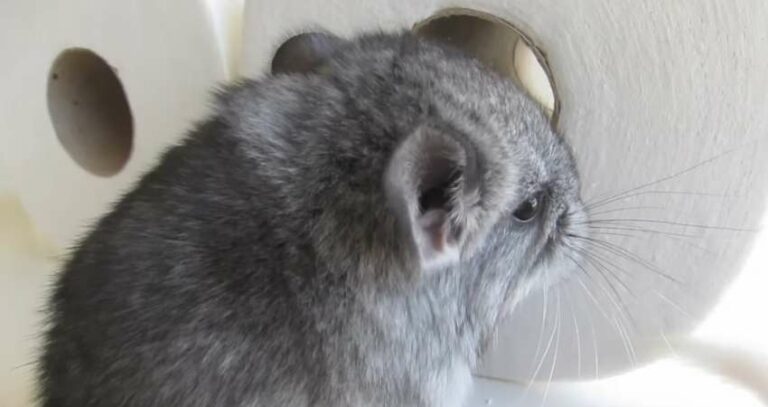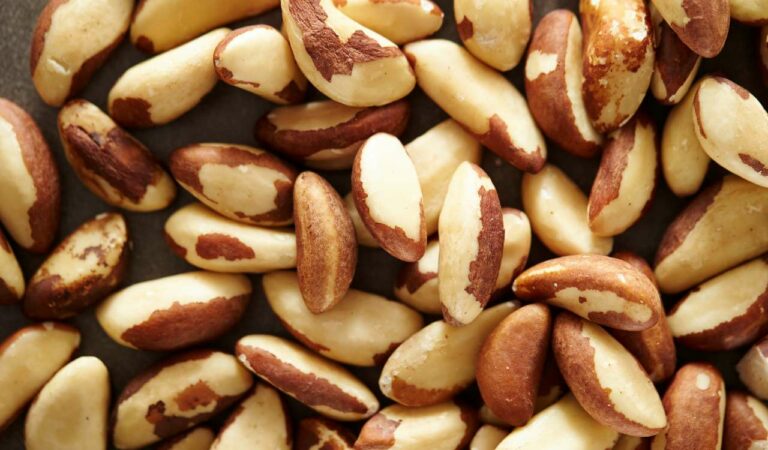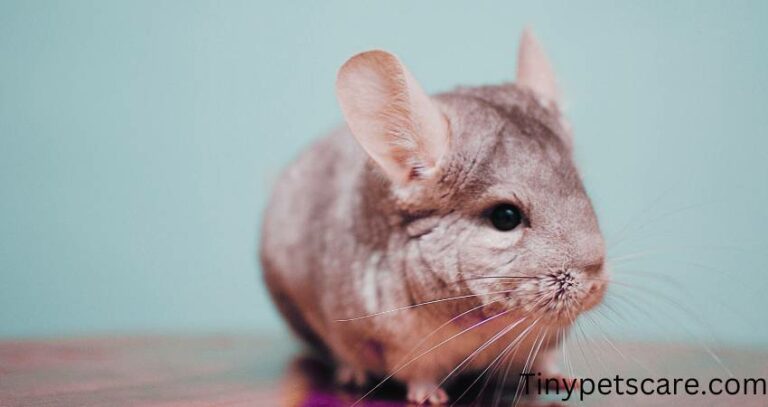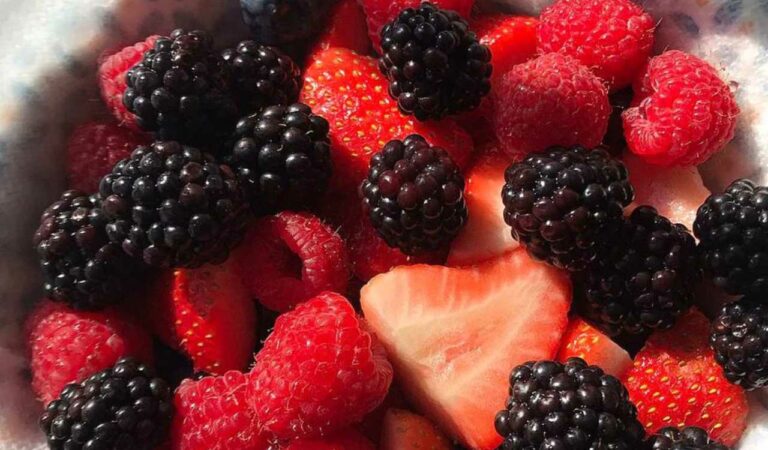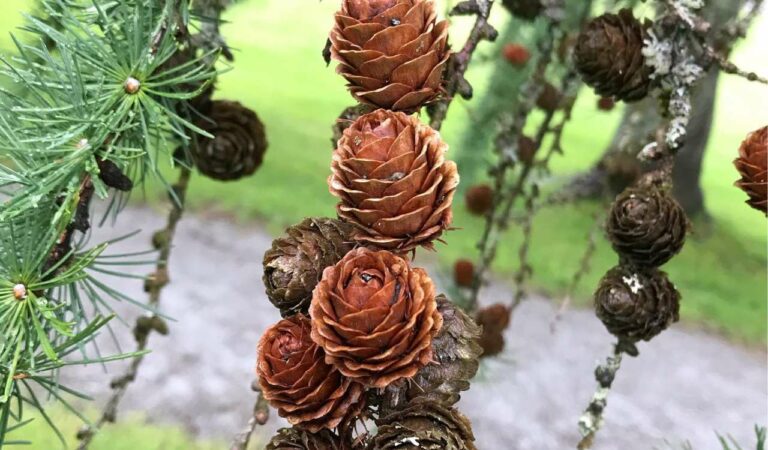Can Chinchillas Eat Almonds? A Nutritional Guide
Almonds are a popular human snack. This often leaves pet owners questioning when a chinchilla can safely indulge in this nutritious nut.
Once in a while, chinchillas can have almonds, but in very limited quantities. The explanation is that almonds are far too fatty. The sensitive chinchilla digestive system isn’t set up for processing large amounts of fats.
I’ll delve into the potential benefits and risks of offering almonds as part of their diet. In addition, I’ll uncover best practices for serving and feeding and suggest safer alternatives to almonds.
Chinchillas Eating Almonds: Unveiling The Truth
When I first got my chinchilla, Sophie, I was wondering about the idea of feeding her almonds since I love them myself!
However, I keep some important factors in mind to ensure Sophie stays happy and healthy.
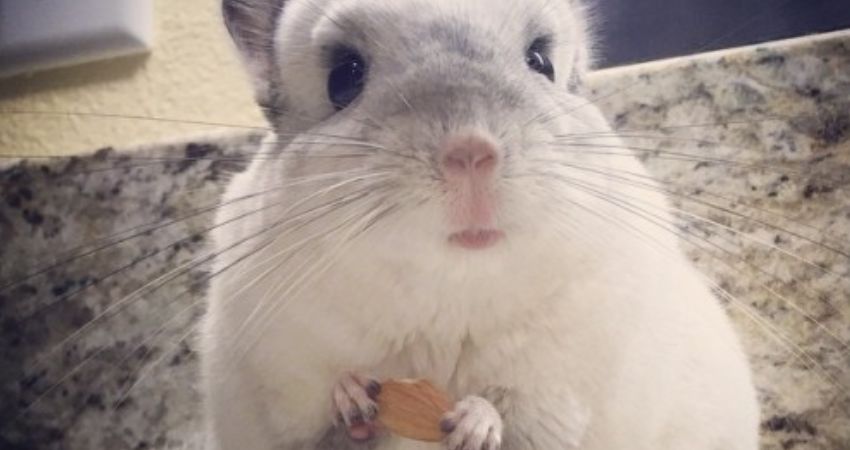
- Essentially, the key lies in moderation, frequency, and the type of almonds I offer.
- Sweet domesticated almonds are ok in tiny quantities. Most importantly, I never feed Sophie the bitter wild almonds.
- According to a study on the Metabolic Basis of Bitter and Sweet Almonds, kernels of bitter wild almonds contain cyanide. This can be deadly to chinchillas, even in small amounts. So, stick strictly to the sweet, blanched, domesticated almonds to be safe.
Just remember – moderation is key when including any new treat in your chinchilla’s diet.
Do Chinchillas Like Almonds?
Well, chinchillas’ preferences can vary between individuals. Like humans, chinchillas have their own unique tastes and curiosities. Some chinchillas take right to almonds as a new treat; others are wary of it.
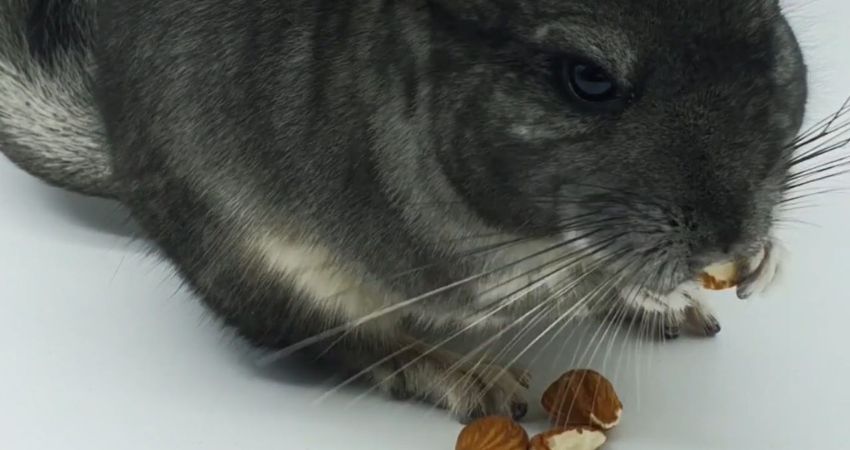
- A study by Kerrin Grant on Rodent Nutrition of 4 Common Rodent Species shows that chinchillas are adapted to a high-fiber, low-fat diet of grasses, herbs, and plants in the wild.
- Almonds, being relatively high in fat, would rarely cross their path in nature. So, there’s no innate preference or nutritional requirement for almonds.
- Sophie will certainly munch on almond slivers when I offer her. But that’s more a sign of her curiosity and exploration of new foods. It’s not a true indication of what’s best for her health.
Nutritional Value Of Almonds
Almonds are one of the most nutritious nuts out there! Here’s a quick rundown of the nutritional value of a 100-gram serving of almonds according to the US Department of Agriculture.
| Nutrient | Amount Per 100 Grams | Chinchillas Requirement |
| Calories | 579 Kcal | 200 cal |
| Fat | 49.9g | 2-5g |
| Proteins | 21.2g | 16-20g |
| Dietary fiber | 12.5g | 15-35g |
| Carbohydrates | 21.6g | 35g |
| Sugar | 4.35g | 4g |
| Water | 4.41g | 10-15g |
In addition to these, almonds contain:
- Vitamin E and B Vitamins
- Antioxidants (flavonoids)
- Phytosterols
- Minerals (Calcium at 269 mg, phosphorus at 481mg, magnesium at 270mg, and potassium at 733 mg per 100g of almonds)
While almonds bring nutrients to the table, portion control is especially key for chinchillas, given their small size and low-fat diet requirements. So go easy on the almond filling for your chinnie!
Are Almonds Good For Chinchillas? Potential Health Benefits
Yeah, almonds do contain some useful nutrients that could offer a few possible perks for chinchillas – as long as they eat them in tiny, controlled amounts. Here are the main ways almonds could marginally benefit chinchillas.
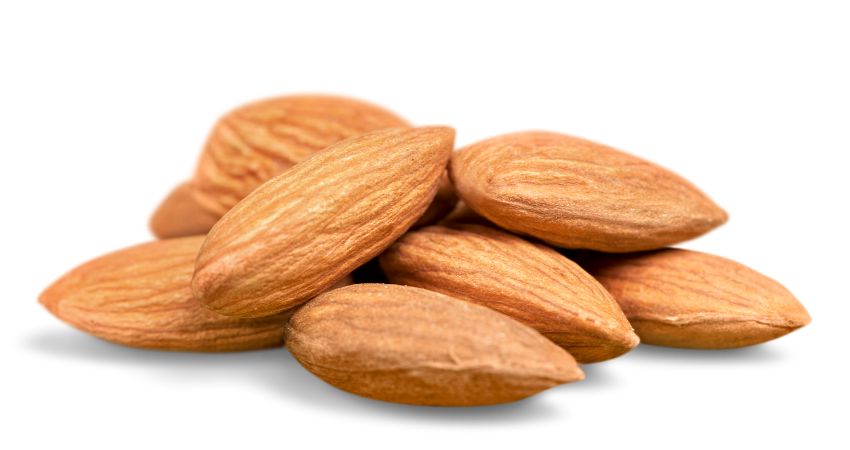
- Fur and skin health: The vitamin E in almonds can help keep chinchillas’ fur and skin in good condition by fighting free radical damage. However, a balanced diet and proper grooming are more important for her fur and skin health overall.
- Energy production: The B vitamins in almonds, like riboflavin and niacin, can aid in chinchilla’s energy production by supporting metabolic processes. But her primary source of energy should come from her chinchilla kibbles and hay.
- Immune support: The antioxidants and minerals in almonds may provide some immune support by reducing oxidative stress and inflammation. However, chinchilla’s immune system depends more on a balanced diet and overall health.
- Chewing enrichment: Chinchilla does enjoy chewing on almond slivers occasionally as a form of enrichment. The harder texture can help them to wear down continuously growing teeth. But toys and wood chews provide more consistent and safe chewing stimulation.
While almonds offer some potential health benefits, they’re neither essential nor optimal for chinchilla’s health and well-being. A balanced chinchilla diet based on hay, pellets, and minimal treats will meet all of Sophie’s nutritional needs.
How Many Almonds To Give Chinchillas?
If you really want to offer your chinchilla a treat, you can consider offering a small piece of almond as an occasional treat. In terms of how much almond I give my chinchillas about 1/8 of a whole almond but infrequent.
How Often Almonds To Give Chinchillas?
I also limit how often Sophie gets almonds, usually just once or twice a month at most. Her regular diet should primarily be her chinchilla pellets and unlimited timothy hay. Treats are an occasional delicacy, not a daily snack. Chinchillas have sensitive digestive systems, and Giving them too often can cause health issues.
Monitor Your Chinchilla
I always monitor my chinchillas after they get almond treats to make sure they’re not upsetting their tummy. If I notice any signs of indigestion, like the runs or bloating, I stop giving her almonds immediately. Not all chinchillas tolerate treats the same way.
How To Prepare and Serve Almonds For Chinchillas?
Here’s how I prepare almonds as an occasional treat for my chinchillas: I only buy small quantities of raw, blanched almonds with no salt or flavorings added. Anything flavored could cause health issues. Then, I go through these steps.
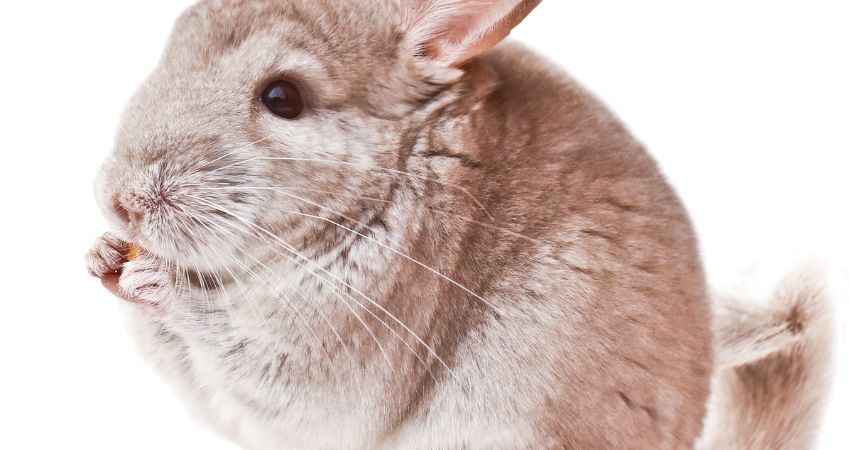
Step 1: I crack the almond shell using my hands or a nutcracker and remove the nut meat inside.
Step 2: I break off a tiny sliver – about 1/8 of a whole almond.
Step 3: I hand feed the bare nut meat to the chinchilla and monitor closely afterward for any signs of digestive upset like diarrhea or loss of appetite. If I notice any issues, I stop offering almonds for a while.
Veterinarians’ Viewpoints On Feeding Almonds To Chinchillas
Vet viewpoints on almonds as chinchilla treats tend to be pretty conservative. Here are the key points from a veterinarian’s perspective:
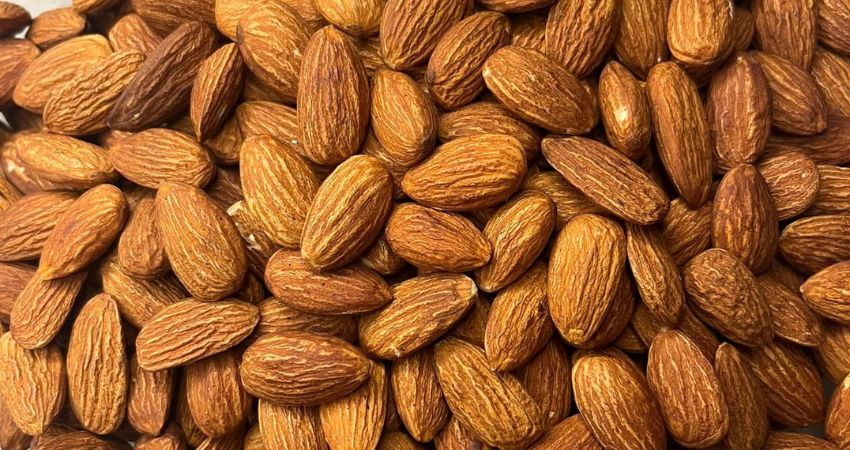
- Focus on chinchilla-specific foods: Vets stress that your chinchilla’s diet should mainly consist of quality chinchilla pellets, unlimited hay, and clean water. These foods are specially formulated to meet their nutritional needs.
- Safe treat alternatives: Instead of almonds, vets often suggest safer treats designed specifically for chinchillas. This includes small pieces of dried fruit (in moderation due to sugar), rose hips, or commercial chinchilla treats.
- Monitor health: Vets recommend keeping a close eye on your chinchilla after introducing any new food, including almond treats. Watch their behavior to catch any negative reactions or digestive issues.
Potential Risks Of Feeding Almonds To Chinchillas
Chinchillas have very specific dietary needs that make almonds a poor choice of treat for these little ones. Here are the main reasons:
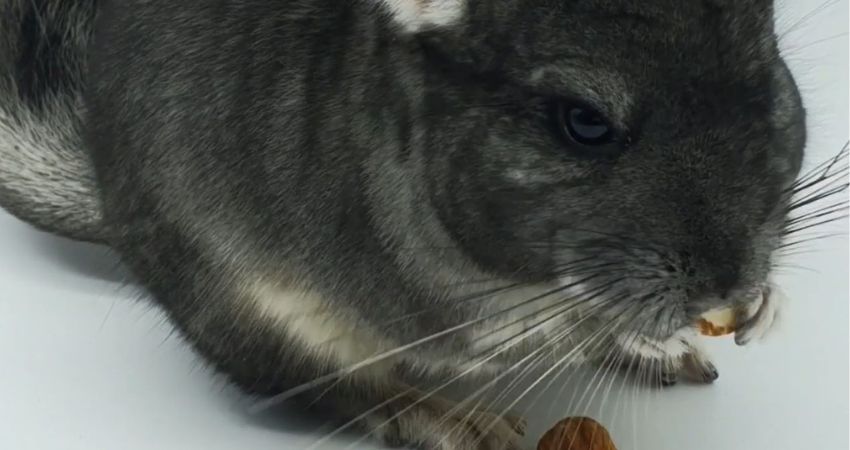
- High-fat content: Almonds are high in fat, but chinchillas require a low-fat diet to stay healthy. Their digestive systems aren’t built to handle the 15 grams of fat in an ounce of almonds very well. All that fat can lead to obesity and poop problems real quick!
- Digestive upset: Chinchillas have delicate digestive systems that are super sensitive to changes in diet. Introducing new foods like almonds – especially high-fat, low-fiber foods – is a recipe for tummy trouble. All that fat can cause diarrhea, constipation, and other digestive issues.
- Calcium-phosphorus ratio imbalance: Almonds have a calcium-to-phosphorus ratio that’s all out of whack for chinchillas. The calcium (269 mg) to phosphorus (481 mg) ratio in almonds is around 1:1.8, meaning they contain 1.8 parts phosphorus for every 1 part calcium.
But chinchillas require a ratio closer to 1.5:1 to 2:1 for maximum calcium absorption and healthy mineral levels.
Can Chinchillas Eat Raw Almonds? Raw Vs Roasted Almonds For Chinchilla
Yes. Raw or lightly roasted almonds can both make suitable treats for chinchillas in small amounts.
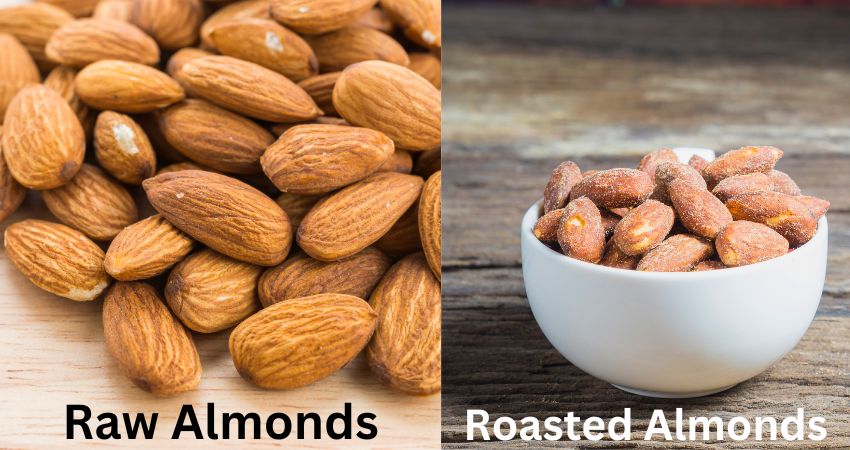
- Essentially, raw almonds have a slightly higher nutrient content since they’re uncooked.
- Plus, they still retain their skin, which provides fiber and some extra vitamins.
- However, raw almonds are a bit harder for chinchillas to chew and digest.
- Lightly roasted almonds are easier for chins to chew since the skins soften during roasting. But they lose some nutrients compared to raw almonds.
The main things to avoid when serving roasted almonds are:
- Salting: Chinchillas can’t handle the extra sodium. It can lead to dehydration, upset tummies, and other health problems.
- Seasoning and flavors: The oils and flavorings in these almonds make them difficult for chins to properly digest.
Bonus Nuts You Can Feed Your Chinchilla
Let’s check out some safe and nutritious bonus nuts you can give your chinchilla sometimes to mix up their diet.
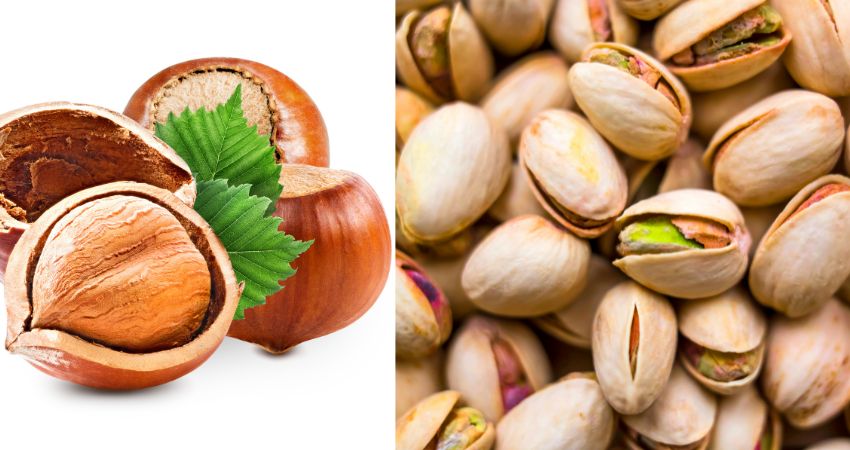
- Hazelnuts are a tasty treat packed with fats, fiber, and minerals. They have 61g fat per 100g serving, more than almonds. Chinchillas can eat hazelnuts, but watch the portion size and offer hazelnuts as an occasional delicacy. It shouldn’t be a regular part of their diet.
- Pistachios are a fave for many, and sharing them with your chinchilla may be tempting. 45g per 100g serving contains less fat than most nuts, including almonds. So, those questioning can chinchillas eat Pistachios have a go-ahead. However, keep the portions super tiny.
- Like other nuts, chinchillas can eat peanuts, but you should not feed peanuts to your chinchilla. Peanuts are rich in fats and oils. Anything high in fat or sugar is bad for chinchilla.
Wrapping Up
While chinchillas can eat almonds, these nuts just aren’t worth the risks for your chinnie’s health. Yeah, they have some nutrients, but nothing your little one can’t live without. Almonds aren’t designed for a chinchilla’s sensitive system.
Your chin will be happiest and healthiest on a diet they’re actually meant to eat – regular chinchilla food like pellets and hay. Those foods are formulated with all the nutrients they need to thrive. If you feel the urge to offer treats, there are safer options designed just for chinchillas.
